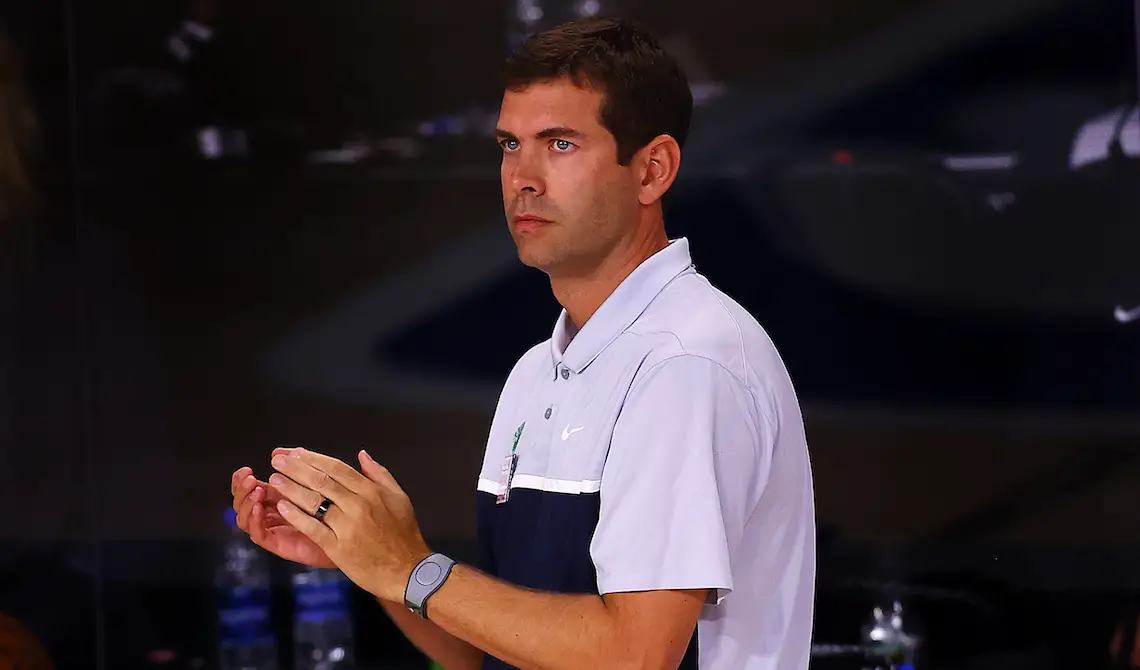
Pool Photo/USA Today Sports
Boston Celtics president of basketball operations Danny Ainge announced Wednesday that he is stepping down, while head coach Brad Stevens plans to take over the role.
It’s a big change for the front office; Danny Ainge has served as the team’s director since 2003 and formerly played for Boston from 1981-1989, winning two championships as a Celtic.
But with the franchise going in-house to elevate Stevens to the title, the management shakeup is likely to go over smoothly.
In addition to becoming the new head of basketball operations, Stevens will also lead the search for the next Celtics head coach.
Why is Brad Stevens leaving his coaching role?
Since he joined the Celtics as head coach in 2013, Stevens has led the team to seven consecutive playoffs, a division championship, and appearances in the Eastern Conference finals in 2017, 2018, and 2020.
But despite a successful run, he’s ready to move on to a front office role with the team.
The timing for the announcement came just one day after Boston was booted from the first round of the playoffs by the Brooklyn Nets on Tuesday night.
Their Game 5 loss brought an end to a season marked by injuries and coronavirus complications for the team, but it also opened up the opportunity to announce plans for these major administrative transitions.
According to ESPN, The NBA Bubble experience during the pandemic contributed to Stevens’ feeling that he was ready to move on from coaching.
His rejection of a generous $70 million, seven-year offer to coach the Indiana University Hoosiers last month also signaled that perhaps Stevens wasn’t looking to stay in coaching for the long haul.
As for Danny Aigne, the decision to move on is largely linked to his health. His transition toward retirement allegedly began after he suffered a heart attack two years ago at age 60.
Ainge’s legacy will likely be celebrated in the upcoming season.
He has been an powerful force within the franchise for nearly two decades, and his time as a Celtic player in the ’80s makes him especially integral to the team’s history.
What does a head of basketball operations do?
Switching to a head of basketball operations role within the same NBA franchise might not seem like huge move.
But Stevens’ new job will be significantly different from his previous one as head coach.
The head of basketball operations (sometimes called the president of basketball operations) oversees all the big-picture facets of the team.
This goes well beyond team staffing, facilities, and game day logistics to also include the business side of things, including sponsorships, budgets, and public relationships.
Head of basketball ops is one of the most wide-reaching roles on any team, and it often involves giving the final say on key decisions.
Not all teams have a president of basketball ops, but it’s one that’s been utilized at both the professional and collegiate level in recent years.
During his time in the Celtics front office, Ainge also held down the title of general manager, so it’s likely that Stevens will take over the GM role as well.
This involves a little more direct involvement with the team, with responsibilities that typically include overseeing contract negotiations, signings, trades, and cuts.
The fact that Stevens is set to oversee the search for the new head coach is another indicator that his role will cover that of both the GM and the head of basketball ops.
Essentially, he’ll serve as the franchise leader by overseeing day-to-day operations as well as long-term strategic planning for the team.
The job is undeniably a complicated and demanding one, but Stevens’ experience as a former head coach in both the NCAA (for Butler University from 2007-2013) and NBA will likely have prepared him for the role.
The future for the Celtics
Although the loss of a head coach is a gamechanger for any team, the Celtics seem happy to keep Stevens on as part of the franchise.
Despite a few rough seasons throughout his tenure in Boston, Stevens has been a stabilizing force for the team overall.
Currently, top players Jayson Tatum and Jaylen Brown have been leading the Celtics.
But the team lacks a deep bench, and Evan Fournier’s free agency could further compromise the team’s star power.
The Celtics’ salary budget is limited at the moment, and some have speculated that the team may decide to trade Kemba Walker, whose $36 million contract could open up other possibilities for the roster.
That leaves some tough decisions in Stevens’ hands during the offseason, but also gives him the chance to revive a team that struggled this year and finished the regular season with a middling record of 36-36.